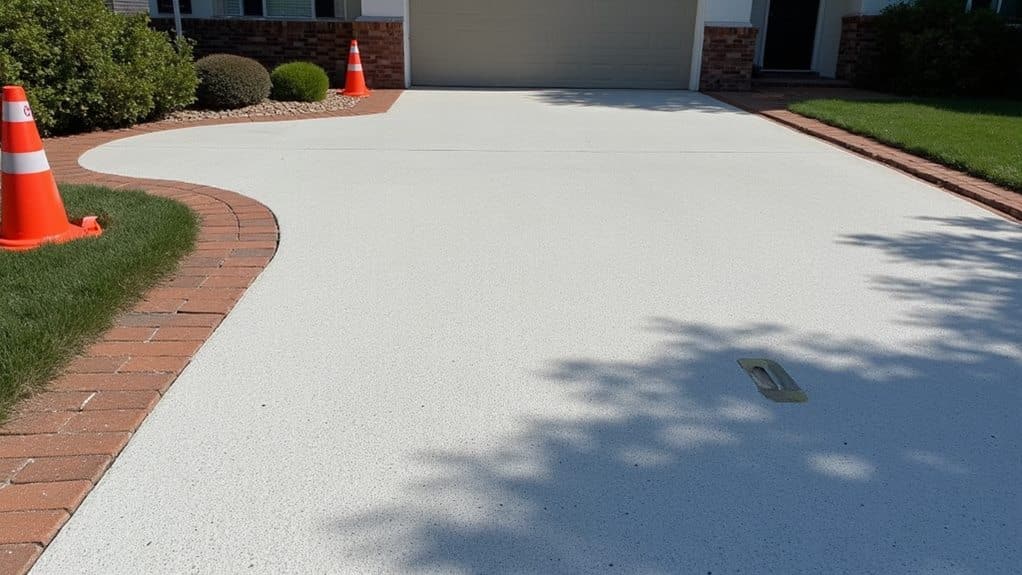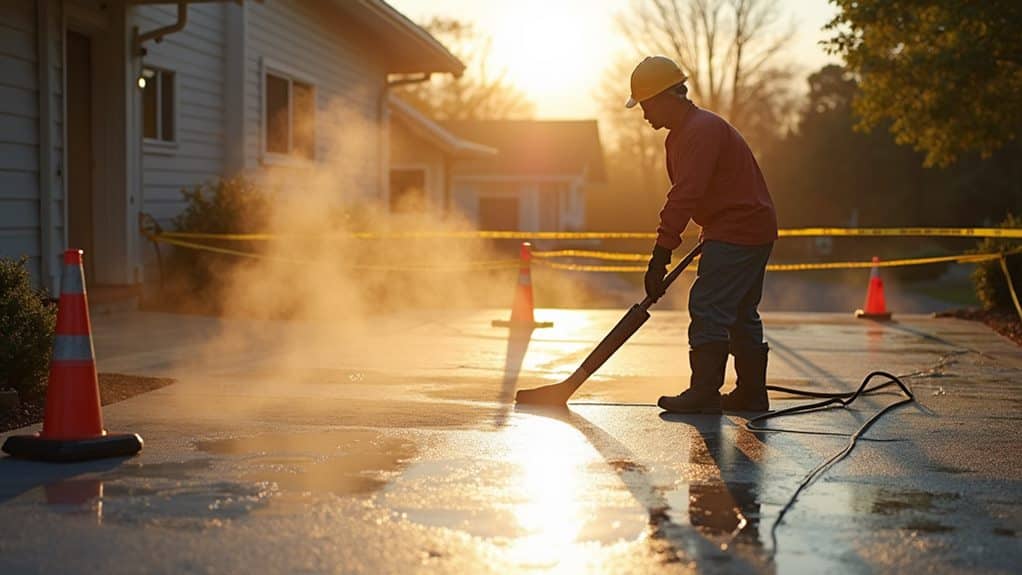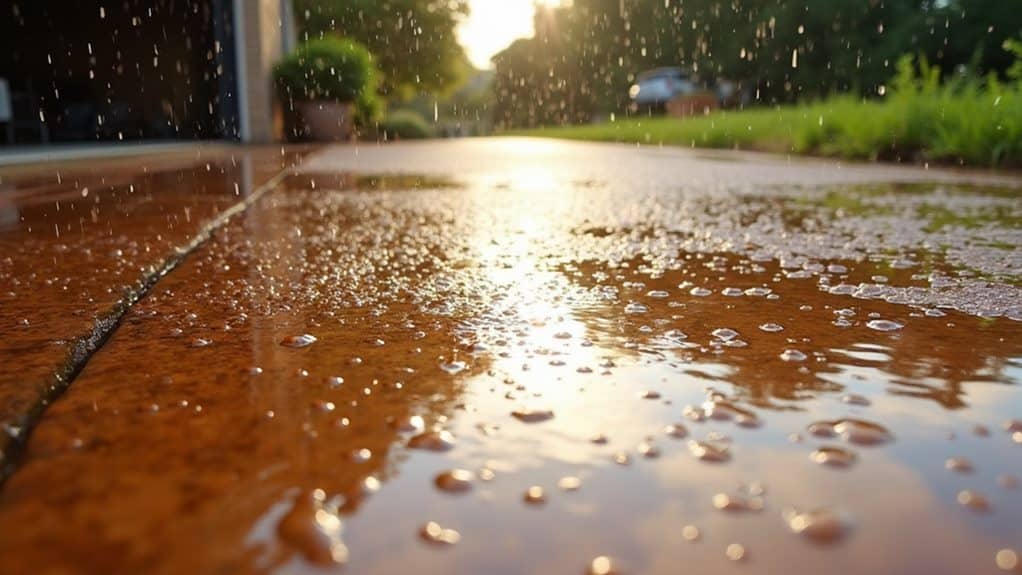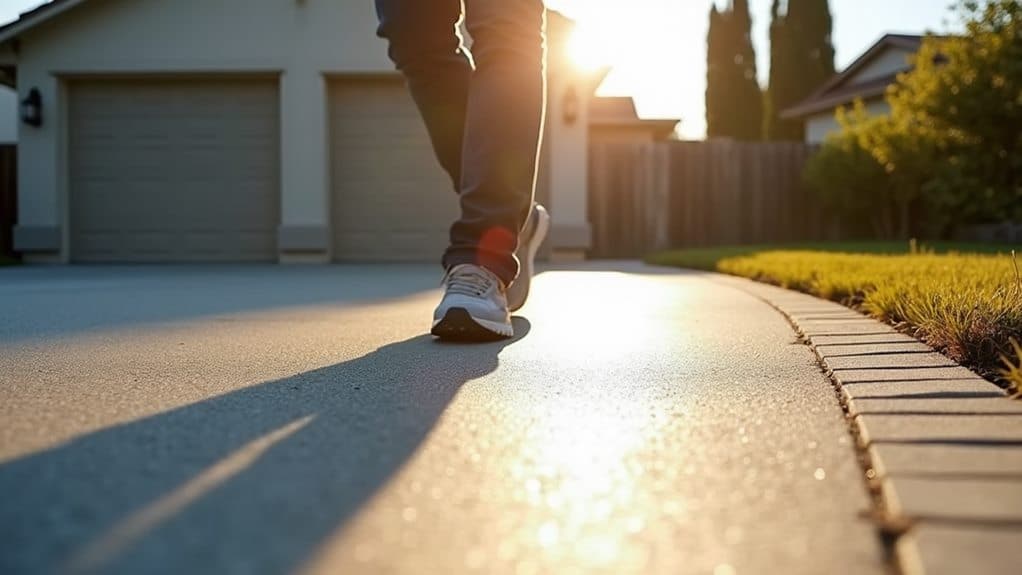For standard resin driveways in the UK, wait 6-8 hours before walking on the surface.
Cars shouldn’t be parked for at least 24 hours, whilst larger vehicles like lorries need 36 hours minimum.
British weather plays a crucial role – warm, dry days speed up curing, but our typical damp or cold conditions will slow things down.
It’s best to rope off the area and allow a full 48 hours for proper curing, particularly during autumn and winter months.
Think of it like waiting for paint to dry in your home – rushing it could spoil the finish.
Local temperature, humidity and the size of your driveway might require longer waiting times than these basic guidelines.
Key Takeaways
Resin driveways require proper curing time for the best results:
You can walk on your resin driveway after 6-8 hours in ideal British weather (warm, dry conditions). However, our typical UK weather can affect these timings – a sunny summer’s day will speed up curing, whilst damp or chilly conditions will slow it down.
The first 24 hours are vital – whilst you can walk on the surface, it’s best to keep foot traffic to a minimum, much like avoiding fresh cement. Pop up some hazard tape and cones to keep people off until it’s properly set.
After 48 hours, your resin driveway will be fully cured and ready for normal use. Think of it like waiting for paint to dry – rushing things only leads to problems later.
For the best results, simply wait the full two days. Your patience will be rewarded with a durable, long-lasting driveway.
Understanding Resin Driveway Curing Times
The curing process is vital for any resin driveway installation. Two key waiting periods must be observed: one for walking and another for driving.
To achieve proper curing, installers must use forced action mixing and maintain correct resin-to-aggregate ratios across the surface. The initial cure takes 6-8 hours, after which light foot traffic becomes possible.
For vehicles, you’ll need to wait 24-36 hours before driving on the new surface. This longer period ensures the resin reaches full strength and durability.
It’s crucial not to rush this process – walking or driving too soon can damage the surface, leading to costly repairs. Think of it like a fresh coat of paint – whilst it might feel dry to touch after a few hours, it needs proper time to fully harden.
Following these timeframes will protect your investment and ensure your resin driveway performs as intended for years to come.
Quick reference:
- Foot traffic: 6-8 hours
- Vehicle access: 24-36 hours
- Full cure: 36 hours
Recommended Waiting Periods

Proper sub-base preparation and weather conditions are crucial for your resin driveway’s curing process.
Wait at least 8 hours before walking on the new surface, and 24 hours before parking your car.
British weather, particularly high humidity and cold temperatures, may extend these waiting times.
For best results, follow the full 48-hour curing period whilst limiting both foot traffic and vehicle use.
Initial Safety Period Guidelines
Strict waiting periods are vital for new resin driveways to reach their full strength. Wait 6-8 hours before walking on your newly installed surface. During this time, the resin begins its crucial curing process, which sets the foundation for its long-term durability. UK installers mix materials on-site and require specific weather conditions for proper curing.
For best results, follow these simple safety guidelines:
- After 6-8 hours: Safe for foot traffic
- After 24-36 hours: Safe for light vehicles (like family cars)
Take extra care during the first 24 hours – walking or driving on the surface too soon will damage your new driveway. Think of it like fresh paint – you wouldn’t want footprints ruining your newly decorated floor.
These waiting periods aren’t just suggestions; they’re essential for ensuring your resin driveway stays pristine and durable for years ahead.
Remember, British weather can affect curing times. In colder or damper conditions, it’s worth waiting a bit longer than the minimum times suggested.
Whilst it might be tempting to use your driveway straight away, particularly if you’re eager to park your car, patience will pay off in the long run.
Walking Vs Vehicle Access
Walking and vehicle access times differ significantly for newly laid resin driveways to ensure proper curing. Pedestrians must wait 8 hours before walking on the surface, whilst vehicles require a minimum 24-hour wait.
| Access Type | Minimum Waiting Period | Vehicle Weight Class |
|---|---|---|
| Pedestrian | 8 hours | N/A |
| Light Vehicles | 24-36 hours | Cars, Small SUVs |
| Heavy Vehicles | 36+ hours | Trucks, Large SUVs |
Sticking to these waiting times is crucial for your driveway’s durability. For family cars and small SUVs, wait 24-36 hours before driving on the surface. Heavier vehicles, such as delivery lorries or large SUVs, need at least 36 hours. These timeframes aren’t just cautionary – they ensure your resin driveway sets properly and maintains its looks and durability for years ahead.
Weather Impact on Curing
Weather conditions significantly affect resin driveway curing times, with temperature being the key factor.
In typical UK conditions, you’ll need to wait at least 6-8 hours before walking on a newly laid resin driveway, though this varies with the weather.
UV-stable resins are essential for British installations, protecting against our varied weather and preventing discolouration, particularly important given our unpredictable sunny spells.
Warmer days speed up curing – think summer afternoons when temperatures reach 20°C or above.
However, typical British weather challenges like cold spells or rain will extend curing times considerably.
Keep an eye on humidity levels, as our often-damp climate can slow down the setting process.
Don’t be tempted to rush things, even if the surface looks dry. Much like waiting for paint to dry properly, the layers beneath need time to cure fully.
Following these timing guidelines, whilst accounting for our changeable British weather, ensures your resin driveway will be durable and long-lasting.
Factors Affecting Setting Time

Temperature and weather significantly impact resin driveway setting times. Warmer conditions speed up curing, whilst high humidity affects how well the resin bonds with stones.
Getting the resin mix ratio spot-on is crucial for proper setting and durability. Best avoid installing when temperatures drop below 5°C, as this slows the process and risks a poor finish.
The driveway’s size matters too – larger projects need careful planning to ensure each section sets properly before moving to the next.
Weather and Temperature Impact
Temperature and weather conditions significantly affect resin driveway curing times. Warm weather speeds up the process, whilst cold conditions extend it beyond the typical 24-36 hour period.
| Weather Condition | Impact on Curing Time |
|---|---|
| Warm & Sunny | Fastest curing (24h) |
| High Humidity | Extended curing |
| Cold & Overcast | Delayed setting |
| Rain or Frost | Installation unsafe |
The curing process works best in warm, sunny conditions when temperatures support proper chemical reactions. Much like waiting for paint to dry, direct sunlight helps sections cure faster than shaded areas, which can create uneven setting times across your driveway.
Weather forecasts need careful monitoring before installation, as high humidity can interfere with proper curing. Installation should never take place during heavy rain or frost, as these conditions will compromise the driveway’s strength. The ideal time for installation is during moderate, stable temperatures with low humidity – think of a typical British spring or early autumn day.
Installation Timing Considerations
Essential timing factors determine when to install your resin driveway. Both project scale and surface conditions affect how long the installation and curing process will take.
Driveway size significantly influences installation timing. UV-stable resins, whilst pricier, offer better colour retention and durability than standard options – particularly important for British weather conditions. Larger driveways naturally take longer to complete, whilst smaller ones can be finished more quickly.
Installing over existing concrete or tarmac is typically faster than starting from scratch with new groundwork.
The size of your contractor’s team affects completion time. A skilled team working efficiently ensures quality whilst maintaining good pace.
Weather plays a crucial role – British temperatures and humidity levels directly impact how the resin sets. Whilst the standard curing period is 24-36 hours, this may vary with weather conditions.
For best results, factor in proper ground preparation, quality materials and sufficient curing time. Though you might manage light foot traffic after 8 hours, allowing full curing time ensures your driveway lasts longer.
Most UK installers recommend avoiding vehicle use for at least 48 hours after completion.
Safety Precautions During Installation

Safety Precautions During Installation
Proper safety measures during resin driveway installation are vital to protect both the surface and people nearby.
With UK installation costs typically between £40-110 per square metre, safeguarding your investment during curing is crucial.
Keep all foot traffic off the surface for at least 8 hours after installation.
Place clear barriers using cones and warning tape around your driveway’s perimeter.
Make sure to tell everyone in your household and regular visitors about these restrictions to avoid any damage to the uncured surface.
Remember to keep pets away – they can easily damage the new surface whilst it’s curing.
Use temporary fencing or gates to block off the area, much like you’d protect a newly-seeded lawn.
Keep an eye on any outdoor activities near the driveway until it’s fully hardened.
These simple precautions will ensure your resin driveway cures properly and achieves its full strength.
Weather Impact on Drying

Weather conditions significantly impact resin driveway curing times. In British summer temperatures, your driveway should be ready for foot traffic within 6-12 hours, though complete curing takes up to 48 hours.
UV-stable resins are worth considering, as they protect against sun damage and discolouration – particularly important for exposed driveways in the UK’s variable climate.
Before installation, check the weather forecast carefully. Rain and high humidity will extend curing times considerably. Temperatures below 10°C can prevent proper curing and affect your driveway’s durability.
These temperature shifts can disrupt the resin’s bonding process. Avoid installing during poor weather conditions throughout the entire curing period. Excess moisture or unexpected rain can hamper the chemical setting process.
For best results, schedule installation during stable weather, ideally in warmer months when temperatures stay reliably above 10°C – typically late spring through early autumn in most parts of Britain.
Protecting Your New Surface

Protecting Your New Surface
Proper protection immediately after resin driveway installation is crucial for optimal curing and lasting durability. You can walk on the surface after about 8 hours, but taking care during this initial period ensures your resin driveway cures properly. The surface needs UV-stable resin for the best flexibility and crack resistance whilst curing.
Set up clear boundaries using hazard tape and traffic cones around your new surface. These visual warnings help prevent accidental foot traffic and damage during the crucial curing phase.
Make sure to tell everyone in your household about the temporary restrictions and show them alternative routes. Put up simple signs pointing visitors to safe walking paths away from the curing resin.
Keep a close eye on children, pets and delivery drivers who might cross the restricted area. If you’re expecting deliveries or visitors, let them know beforehand and explain how to access your property safely.
These measures might seem like a faff, but they’re worth it to protect your investment and ensure your driveway performs brilliantly for years to come.
Long-Term Care Guidelines

Long-Term Care Guidelines for Resin Driveways
A proper maintenance routine will help your resin driveway last 25+ years. Clean regularly with a stiff broom and gentle soap to keep it looking fresh.
In winter, stick to non-metal snow removal tools to avoid scratching the surface.
Give your driveway a thorough pressure wash once a year to shift stubborn dirt. Clean up any spills straightaway – while resin is tough against frost damage, keeping it clean maintains its smart appearance.
Check your driveway thoroughly every few years for wear and tear. Sort out any small problems promptly with a resin repair kit from your local DIY shop.
Catching issues early prevents bigger headaches later. These simple maintenance steps protect both your driveway’s look and your investment.
Frequently Asked Questions
When Can I Walk on My New Resin Driveway?
Wait 6-8 hours before stepping onto your newly laid resin driveway. The British weather plays a crucial role in curing time – on damp or cold days, you might need to wait longer. For the best results, keep off the surface completely until it’s fully set. Think of it like waiting for paint to dry – patience now means a perfect finish later.
How Long Does a Resin Drive Take to Harden?
Resin driveways initially set within 24-36 hours, but require up to 7 days to fully harden, with timing varying based on British weather conditions. Think of it like waiting for concrete to dry – you can walk on it after a day, but your car needs to wait a bit longer.
How Long Before You Can Walk on Epoxy Resin?
Wait 6-8 hours before walking lightly on an epoxy resin surface. For best results, avoid heavy foot traffic or placing furniture for 24-72 hours whilst the surface properly cures. This timing ensures your epoxy coating develops its full strength and durability.
What Happens if It Rains on a Newly Laid Resin Drive?
Rain falling on a freshly laid resin driveway can seriously affect its curing process, leading to patchy areas and poor surface bonding. The resin might not set properly, causing unsightly blemishes and potential structural issues. If rain is forecast during installation, covering the area with heavy-duty tarpaulin is essential to protect your investment and ensure proper curing.
Conclusion
Follow your manufacturer’s guidance for curing times, but typically you can walk on a resin driveway after 24-48 hours and drive on it after 3-5 days. UV-stabilised resin driveways, when properly cured, keep their strength for around 25 years – much like a well-built patio. For best results, install during dry weather, keep the surface clean and avoid any heavy items during the setting period.
